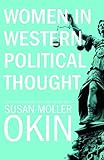Women in Western Political Thought / Susan Moller Okin.
Material type: TextPublisher: Princeton, NJ : Princeton University Press, [2013]Copyright date: ©2013Description: 1 online resource (440 p.)Content type:
TextPublisher: Princeton, NJ : Princeton University Press, [2013]Copyright date: ©2013Description: 1 online resource (440 p.)Content type: - 9780691158341
- 9781400846832
- 305.42 23
- HQ1206 .O38 2013
- online - DeGruyter
- Issued also in print.
| Item type | Current library | Call number | URL | Status | Notes | Barcode | |
|---|---|---|---|---|---|---|---|
 eBook
eBook
|
Biblioteca "Angelicum" Pont. Univ. S.Tommaso d'Aquino Nuvola online | online - DeGruyter (Browse shelf(Opens below)) | Online access | Not for loan (Accesso limitato) | Accesso per gli utenti autorizzati / Access for authorized users | (dgr)9781400846832 |
Frontmatter -- Contents -- Introduction to the 2013 Edition -- Acknowledgment -- Introduction -- PART I. PLATO -- 1. Plato and the Greek Tradition of Misogyny -- 2. Philosopher Queens and Private Wives -- 3. Female Nature and Social Structure -- PART II. ARISTOTLE -- 4. Woman's Place and Nature in a Functionalist World -- PART III. ROUSSEAU -- 5. Rousseau and the Modern Patriarchal Tradition -- 6. The Natural Woman and Her Role -- 7. Equality and Freedom-far Men -- 8. The Fate of Rousseau's Heroines -- PART IV. MILL -- 9. John Stuart Mill, Liberal Feminist -- PART V. FUNCTIONALISM, FEMINISM AND THE FAMILY -- 10. Women and Functionalism, Past and Resent -- 11. Persons, Women, and the Law -- 12. Conclusion -- Appendix to Chapter 4 -- Afterword to the 1992 edition -- Notes -- Bibliography -- Index
restricted access online access with authorization star
http://purl.org/coar/access_right/c_16ec
In this pathbreaking study of the works of Plato, Aristotle, Rousseau, and Mill, Susan Moller Okin turns to the tradition of political philosophy that pervades Western culture and its institutions to understand why the gap between formal and real gender equality persists. Our philosophical heritage, Okin argues, largely rests on the assumption of the natural inequality of the sexes. Women cannot be included as equals within political theory unless its deep-rooted assumptions about the traditional family, its sex roles, and its relation to the wider world of political society are challenged. So long as this attitude pervades our institutions and behavior, the formal equality women have won has no chance of becoming substantive.
Issued also in print.
Mode of access: Internet via World Wide Web.
In English.
Description based on online resource; title from PDF title page (publisher's Web site, viewed 26. Nov 2019)


